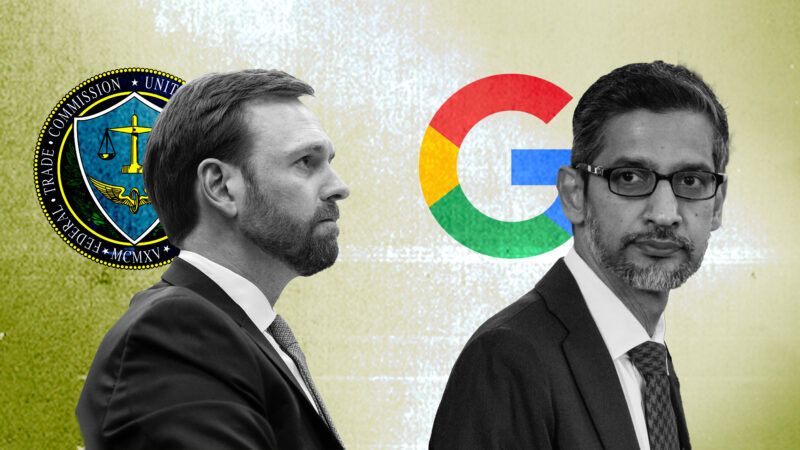Donald Trump's Antitrust Enforcers Continue Their Harassment Campaign Against Google
There is no hard evidence of Gmail discriminating against Republican campaign emails, but that’s no matter to the FTC Chairman.

Despite a defeat in federal court on Tuesday, the Trump administration's antitrust enforcers are still going after Google.
Federal Trade Commission (FTC) Chairman Andrew Ferguson sent Sundar Pichai, CEO of Google's parent company, Alphabet, an email last week notifying him that "Alphabet may be engaging in unfair or deceptive acts or practices," which would violate the FTC Act and justify federal antitrust enforcement.
In his email to Pichai, Ferguson says it's his "understanding from recent reporting" that Gmail is "routinely block[ing] messages…from Republican senders but fail[ing] to block similar messages sent by Democrats." He specifies that "Alphabet's alleged partisan treatment of comparable messages or messengers in Gmail to achieve political objectives may violate" Section 5(a) of the FTC Act, which prohibits unfair and deceptive practices.
But the "recent reporting" that Ferguson cites does not support his missive.
The chairman's primary citation is a recent New York Post article, which claims Google was caught "flagging Republican fundraising emails as 'dangerous' spam—keeping them from hitting Gmail users' inboxes—while leaving similar solicitations from Democrats untouched" (emphasis added). The Post article is based on a memo obtained from Targeted Victory, a Republican digital strategy firm. From this memo, the Post shared Targeted Victory's unlisted YouTube video, which shows one of two nearly identical emails being flagged. The Post imprecisely reports that "the only difference being that one contained a WinRed donation link and the other contained an ActBlue link."
If you watch the video closely, you will notice that the emails' hyperlinks do not direct to the WinRed or the ActBlue campaigns. Instead, the "WR Hyperlink Test" email includes a link to a Google Doc that itself has a link to a WinRed website. Likewise, the "AB Hyperlink Test" email includes a link to a different Google Doc that links to an ActBlue website.
The video shows only the "WR Hyperlink Test" email being accompanied by a warning banner that, upon opening, reads, "This message seems dangerous." The banner prompts the recipient to choose between "Report spam" and "Looks safe." Still, neither message was prevented "from hitting Gmail users' inboxes," like Ferguson says, and the Post reported. Though Targeted Victory claims "many cases" of Gmail sending emails containing WinRed links "directly to spam," the video fails to furnish a single example.
Moreover, when Reason recreated Targeted Victory's video exactly, neither email was flagged. When Reason sent emails actually including WinRed and ActBlue links—instead of Google Doc links—the result was the same: Neither email was flagged. The Tennessean also reports that "no warning labels were present" when it attempted to replicate the video's example.
Perhaps Targeted Victory's memo, which was acquired exclusively by the Post, includes damning evidence of Gmail discriminating against Republican campaign emails. But that's not what the video shows, and that's not what Ferguson saw. (The Post did not respond to Reason's request for the memo.)
A Google spokesperson offered an alternative explanation to The Tennessean: Gmail's "filters are applied equally to everyone, regardless of their political views." As the spokesperson explained to the paper, "a third-party vendor placed WinRed on its blocklist…after campaigns sent emails with links to WinRed to Gmail users who hadn't opted in to receiving emails. Email servers like Google regularly receive lists from third-party services of potentially harmful or unwanted links and emails."
Ferguson also cites a comment jointly filed on behalf of the National Republican Senatorial Committee (NRSC) and the National Republican Congressional Committee (NRCC) to the FTC's request for public comments regarding technology platform censorship, which claims that "a mere 30 percent…of NRSC emails were successfully delivered to the primary inboxes of Gmail users." The letter does not provide a source, nor does it specify what percentage of analogous Democratic emails reached Gmail users' inboxes.
Ferguson's last piece of evidence is the notice of oral argument in Republican National Committee (RNC) v. Google Inc. (2025). In the case, which was first dismissed in 2023 and again with prejudice in 2024, the RNC alleges that Google deliberately diverted its emails to users' spam folders. The chairman invokes the ongoing litigation as evidence of "similar concerns" to his own. Daniel J. Gilman, a senior antitrust scholar at the International Center for Law and Economics, reminds the good chairman that the RNC's appeal "substantiates only the fact of the appeal, not the facts alleged, much less a finding of illegality under any federal or state law."
Extraordinary claims demand extraordinary evidence. Evidence that Ferguson does not appear to have.


Show Comments (8)